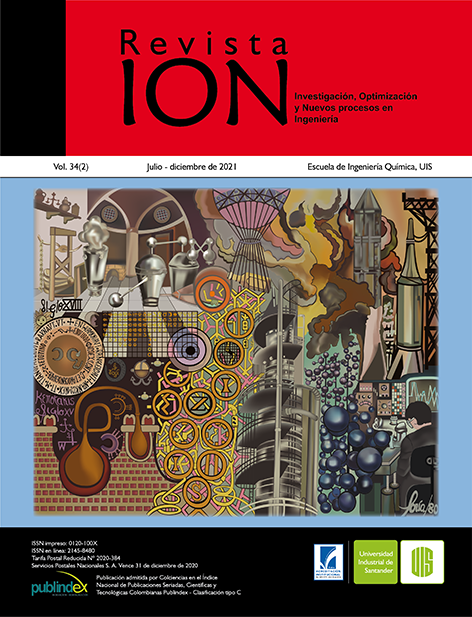Babassu coconut (Orbignya speciosa Mart.) oil extracted industrially and manually as feedstock for biodiesel production
Published 2021-09-02
Keywords
- Transesterification,
- Pour point,
- Chromatography,
- Flash point
How to Cite
Abstract
The use of renewable energy sources, such as vegetable oils like babassu coconut (Orbignya speciosa Mart.) oil extracted industrially and manually, has economic and environmental advantages. In this scenario, the present work presents the production and characterization biodiesel of babassu coconut oil extracted industrially and manually. Biofuels were obtained by alkaline transesterification, using potassium hydroxide and methanol. The characterization was performed by infrared with Fourier transform (FTIR), kinematic viscosity, density, sulphated ash, acidity index, pour point, flash point and gas chromatography. According to the results, the Fourier-transform infrared spectroscopy FTIR spectra showed characteristic absorption of esters, the C=O bond stretches (1704 cm-1 and 1742 cm-1) and C-O (1112 cm-1 and 1111 cm-1). The results of the kinematic viscosity, density, acidity index, pour point and flash point tests were in compliance with the limits established by the ANP, Resolution no. 45/2014. The gas chromatography showed the predominance of methyl esters derived from lauric (C12:0), miristic (C14:0) and palmitic (C16:0) acids. Thus, babassu coconut oil extracted industrially and manually proved to be viable for the production of biodiesel, presenting itself as a potential raw material for the biofuel sector, given the significant volume of babassu plantations in the state of Maranhão.
Downloads
References
[2] Banković-Ilić, IB, Stamenković OS, Veljković VB. Biodiesel production from nonedible plant oils. Renew. and Sust. Ener. Rev.2012;16(6):3621-3647.
[3] International Energy Agency (IEA). Key world energy statistics: Secure Sustainable Together. Paris, France; 2016.
[4] Leon-Pulido J, Fajardo-Moreno WS, Arias-Tapia M, Delgado ADG, Cárdenas-Concha VO, Nunhez JR. Estudo termoquímico assistido por computador para a produção de biodiesel. Rev. ION. 2019;32(2):77-84.
[5] Gumus M, Kasifoglu S. Performance and emission evaluation of a compression ignition engine using a biodiesel (apricot seed kernel oil methyl ester) and its blends with diesel fuel. Bio. Bioener. 2010;34(1):134-139.
[6] Azad AK, Rasul MG, Khan MMK, Sharma SC, Hazrat MA. Prospect of biofuels as na alternative transport fuel in Australia. Renew. and Sust. Ener. Revi. 2015;43(1):331-351.
[7] Bhuiya MMK, Rasul MG, Khan MMK, Ashwath N, Azad AK, Mofijur M. Optimisation of oil extraction process from Australian native beauty leaf seed (Calophyllum inophyllum). Ene. Proc. 2015;75(1):56-61.
[8] Teixeira MA. Babassu ‒ A new approach for an ancient Brazilian biomass. Biom. & Bioen. 2008;32(9):857-864.
[9] Souza MHSL, Monteiro CA, Figueiredo PMS, Nascimento FRF, Guerra RNM. Ethnopharmacological use of babassu (Orbignya phalerata Mart) in communities of babassu nut breakers in Maranhão, Brazil. Jour. of Ethno. 2011;133(1):1-5.
[10] Emmerich FG, Luengo CA. Babassu charcoal: A sulfurless renewable thermo-reducing feedstock for steelmaking. Biom. and Bioen. 1996;10(1):41-44.
[11] Nascimento PS, Lima LAP. Mapeamento Social da Região Ecológica do Babaçu. Projeto Nova Cartografia Social da Amazônia Cartografia Social dos Babaçuais. São Luís: Programa de Pós-Graduação Cartografia Social e Política
na Amazônia (Projeto), Universidade Estadual do Maranhão; 2015. 1 mapa; 130x110; escala 1:1.000.000.
[12] Santos NA, Tavares MLA, Rosenhaim R, Silva FC, Fernandes Jr VJ, Santos IMG, Souza AG. Thermogravimetric and calorimetric evaluation of babassu biodiesel obtained by the metanol route. Jour. of Ther. Anal. and Calori. 2007;87(3):649-652.
[13] Silverstein RM, Webster FX, Kiemle DJ. Spectrometric Identification of Organic Compounds.17 ed. USA: John Wiley and Sons; 1997.
[14] Madiwale S, Bhojwani V. An overview on production, properties performance and emission analysis of blends of biodiesel. Proc. Tech. 2016;25(1):963-973.
[15] Agência Nacional do Petróleo, Gás Natural e Biocombustíveis - ANP. Resolução ANP nº 45/2014. Dispõe sobre a especificação do biodiesel contida no Regulamento Técnico ANP nº 3 de 2014 e as obrigações quanto
ao controle da qualidade a serem atendidas pelos diversos agentes econômicos que comercializam o produto em todo o território nacional. Diário Oficial da União. 2014 aug 26; 151(163 seção 1): 68.
[16] Alptekin E, Canakci M. Characterization of the key fuel properties of methyl ester– diesel fuel blends. Fuel. 2009;88(1):75-80.
[17] Knothe G, Gerpen JV, Krahl J, Ramos LP. Manual de Biodiesel. 3. ed. Brasil, São Paulo: Editora Blucher, 2011.
[18] Celestino KM, Manual AK, João PG. Synthesis of biodiesel from transesterification mufuko oil. Tecno. Quí. 2020;40(1):35-51.
[19] Van Gerpen J, Shanks B, Pruszko R, Clements D, Knothe G. Biodiesel Analytical Methods. USA, Colorado: National Renewable Energy Laboratory, 2004.
[20] Dwivedi G, Sharma MP. Impact of cold flow properties of biodiesel on engine performance. Renew. and Sustain. Ener. Revi.2014;31(1):650-656.
[21] Agência Nacional do Petróleo, Gás Natural e Biocombustíveis - ANP. Resolução ANP nº 52/2010. Estabelece, no Regulamento Técnico ANP, as especificações dos combustíveis aquaviários comercializados pelos diversos
agentes econômicos em todo o território nacional. Diário Oficial da União. 2010 dez 29; 147(250 seção 1): 195.
[22] Hasan MM, Rahman MM. Performance and emission characteristics of biodiesel–diesel blend and environmental and economic impacts of biodiesel production: a review. Renew. and Sust. Ener. Rev. 2017;74(1):938-948.


